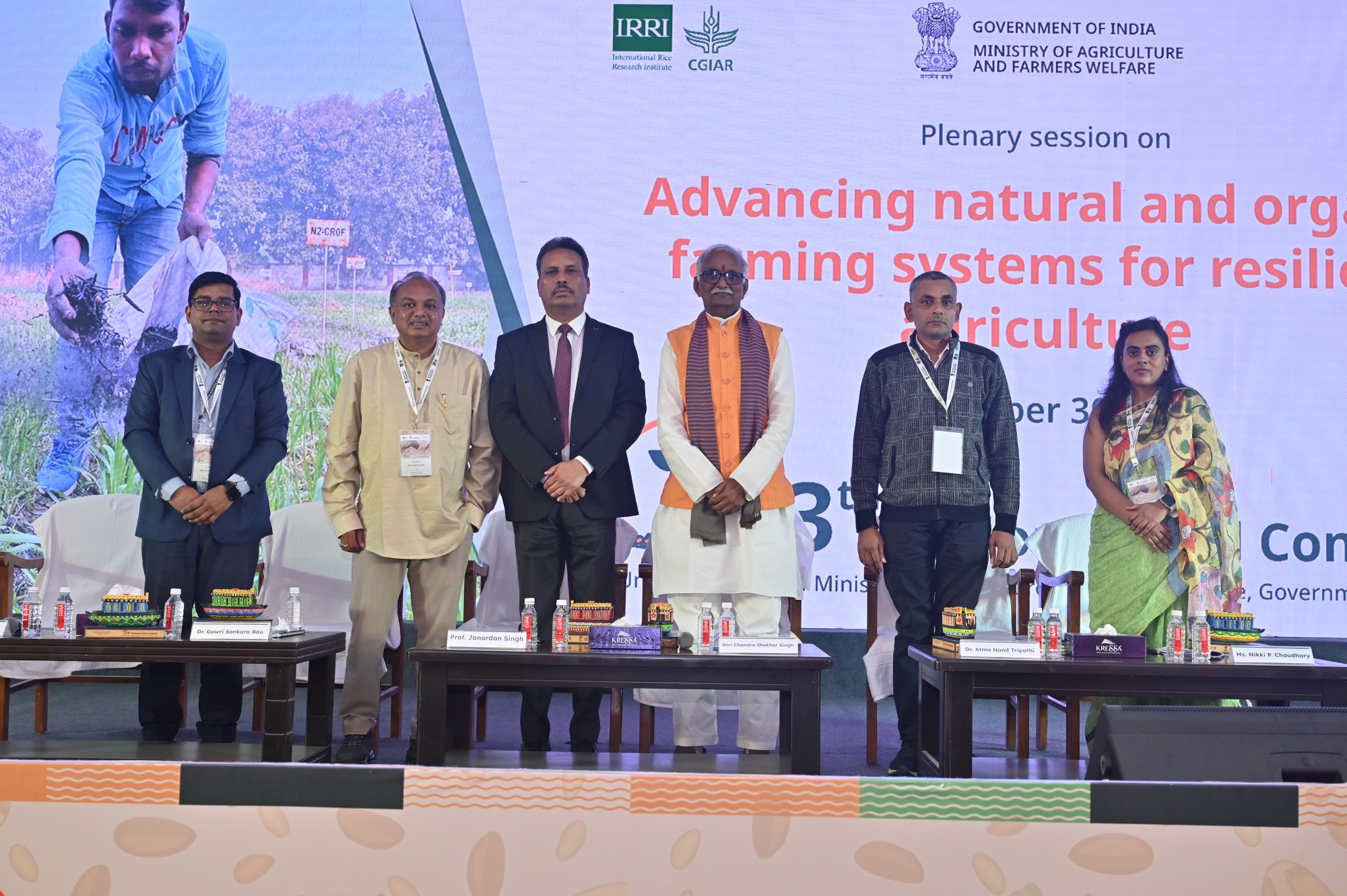NSC 2024: Organic farming systems can unlock greater sustainability and climate resilience for India’s food systems

Varanasi, India, 30 November 2024 - At the 13th National Seed Congress (NSC 2024), a transformative plenary session illuminated the critical role of natural and organic farming systems in creating a resilient and sustainable agricultural future. The session brought together experts, farmers, and thought leaders to discuss the opportunities and strategies that can drive India’s agricultural sector toward greater sustainability. The message was clear: organic farming holds the key to a thriving agricultural landscape, one that can withstand the challenges of climate change and ensure long-term food security.
Moderated by Dr. Ajay K. Mishra, Associate Scientist at IRRI, the session featured a distinguished panel of speakers, including Prof. Janardan Singh, Head of the Department of Organic Agriculture & Natural Farming at CSKHPKV, Palampur; Dr. Gagnesh Sharma, Director of the National Centre for Organic and Natural Farming; Sh. C. P. Srivastava, Former Deputy Director at GoUP; Ms. Nikki Pilania Chaudhary, Founder of Mango Dairies; and Shri Chandra Shekhar Singh (Padma Shri), Founder of Vasundhara Naturals. Together, they shared their collective insights on the transformative potential of organic farming systems for a sustainable future.
The conversation centered on how organic farming, with its focus on biodiversity, soil health, and sustainable practices, can be scaled up across the country. At the heart of the discussion was the importance of making organic farming accessible, economically viable, and scientifically grounded.
One of the key recommendations for advancing organic practices was the need to improve accessibility to organic inputs. Affordable, ready-to-use bio-fertilizers, bio-pesticides, and bio-fungicides are essential to ensuring that organic farming can deliver consistent yields while reducing the reliance on chemical inputs. These organic solutions are not just a tool for farmers—they are a vital step in transitioning to sustainable agricultural practices that protect both the environment and human health.
The session also highlighted the importance of soil fertility in organic farming. Practices such as crop rotation, intercropping, and green manuring were discussed as essential strategies to restore and maintain soil health. These methods not only enrich the soil with organic matter but also promote microbial activity, which is critical for nutrient cycling and overall soil vitality. By enhancing soil health, farmers can improve productivity while reducing the need for synthetic fertilizers and pesticides.
Another key focus was the recycling of crop residues. Incorporating post-harvest residues back into the soil is a powerful practice for nutrient recycling, helping to replenish the soil with essential nutrients and promoting the health of soil microbes. This process, while simple, plays a pivotal role in maintaining long-term soil fertility and promoting the sustainability of farming systems.
As the discussion continued, the importance of training farmers in soil health and organic farming practices was underscored. To make organic farming a widespread success, farmers must be equipped with the knowledge and tools to understand soil dynamics, the role of microbes, and how to maintain healthy soil ecosystems without relying on chemical inputs. This knowledge sharing can empower farmers to make informed decisions that align with sustainable farming practices.
Investment in research for organic-specific crop varieties was also identified as a critical priority. Developing pest-resistant, disease-resistant, and nutrient-rich crop varieties suited for organic farming can help farmers achieve greater yields while overcoming the challenges of pests and diseases. Such innovations can support the growth of organic agriculture by improving crop resilience and productivity.
The session also stressed the importance of preserving traditional and organic seed varieties. Establishing seed banks to conserve drought-tolerant, disease-resistant varieties is a critical step in ensuring resilience against climate change. These seed banks serve as a safeguard, helping farmers access the best seeds for their specific conditions and preserving biodiversity for future generations.
To support the transition to organic farming, the need for dedicated organic farming zones was discussed. These zones, backed by regulatory support, infrastructure, and incentives, would streamline the adoption of organic practices. Creating such zones could make it easier for farmers to transition to organic systems, providing them with the support needed to overcome initial challenges and increase their market access.
Finally, the importance of certification and quality assurance for organic products was emphasized. Simplifying the certification process and making it more affordable for farmers will increase trust in organic products and expand market opportunities. Additionally, offering price premiums for organic products could incentivize farmers to adopt these practices, ensuring economic viability alongside environmental sustainability.
In conclusion, the plenary session called for a unified effort from all stakeholders—government, industry, research institutions, and farmers—to prioritize organic farming as a solution to the challenges of modern agriculture. By embracing natural farming systems, India has the opportunity to lead the way in creating a more sustainable agricultural future. Through innovation, collaboration, and a focus on soil health, biodiversity, and farmer empowerment, the country can build a resilient agricultural sector that will thrive for generations to come.
This session provided a roadmap for integrating organic practices into India’s agricultural value chain, offering actionable steps to build a healthier, more sustainable farming and food system.

